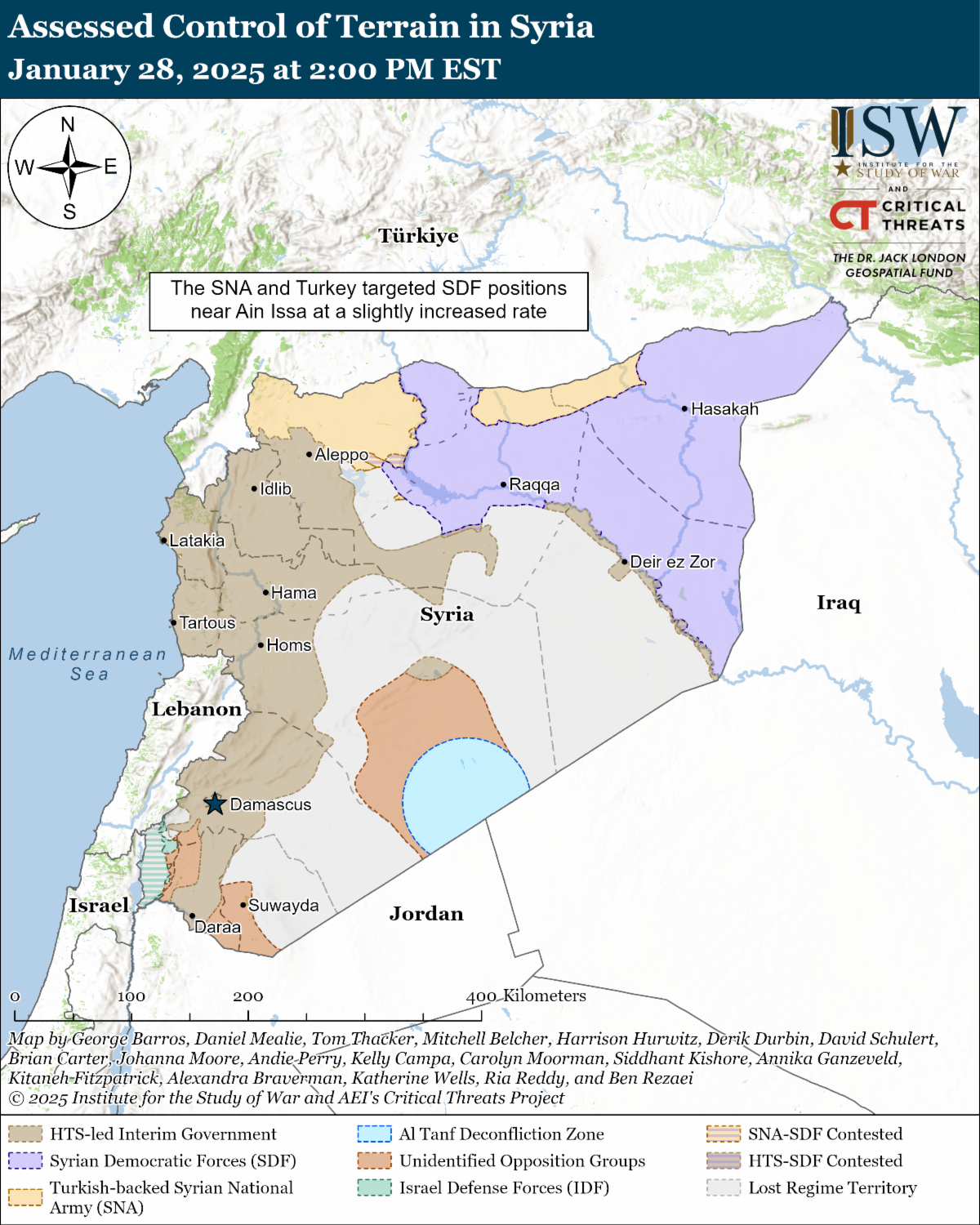Turkish officials appear to believe that a planned call by imprisoned PKK leader Abdullah Ocalan for the Kurdistan Workers’ Party (PKK) to disarm would pressure the SDF into an agreement to disarm and integrate into the HTS-led interim government. Turkey and Ocalan have reportedly reached an agreement in which Ocalan will publicly call on the PKK to “lay down arms” on February 15. Unspecified Turkish officials told regional media on January 27 that Ocalan's announcement would "easily" pressure the SDF to integrate into the Syrian Defense Ministry. This belief reflects misplaced Turkish thinking that the entire SDF will be responsive to PKK demands, which is unlikely. The SDF is composed of Syrian Kurds, some of whom were members of the PKK. The SDF’s leadership presumably recognizes that Turkish-backed attacks pose a possibly existential threat to the SDF and Kurds, given that many Turkish-backed forces have previously committed human rights abuses against Kurdish people in northwestern Syria. The SDF is unlikely to willingly give up its ability to defend Kurdish areas against active military attacks, regardless of Ocalan’s position.
The Turkish theory that the disarmament of the PKK would cause the SDF to disarm and integrate into the Syrian Defense Ministry directly conflicts with how the SDF views its future in the Syrian government and northeastern Syria. The SDF has articulated clear and specific demands since it began talks with the HTS-led government in late December 2024. These demands include joining the new Syrian army as an integrated unit, remaining deployed in northeastern Syria, and maintaining some regional autonomy in a ”decentralized” system. It is unlikely that the SDF would ”easily” give up these demands if the PKK disarms.
An unspecified source told Middle East Eye that Turkey seeks to encourage Kurdish political parties, including the Democratic Union Party (PYD), to participate in the political system in Damascus. The PYD controls the Autonomous Administration of North and East Syria (AANES), which governs SDF-controlled areas in northeastern Syria. The SDF and PYD almost certainly hope to be involved in the political system in Damascus, but that is not mutually exclusive with SDF demands for regional autonomy. The SDF’s stated demands suggest that it would not be satisfied with mere political representation in Damascus and that it seeks firmer guarantees of political and security autonomy.
Key Takeaways:
- Kurds in Syria: Turkish officials appear to believe that a planned call by imprisoned PKK leader Abdullah Ocalan for the PKK to disarm would pressure the SDF into an agreement to disarm and integrate into the HTS-led interim government. The Turkish theory that the disarmament of the PKK would cause the SDF to disarm and integrate into the Syrian Defense Ministry directly conflicts with how the SDF views its future in the Syrian government and northeastern Syria.
- Iranian Nuclear Program: Iranian Foreign Affairs Minister Abbas Araghchi implicitly threatened that Iran could decide to pursue a nuclear weapon during an interview with Sky News on January 28.
- Russia in Syria: The first official Russian delegation arrived in Syria since the fall of the Assad regime on January 28 to discuss Russia's continued use of its military bases in Syria. The Russian military continues to evacuate military assets from the Port of Tartus amid the ongoing Russian-Syrian negotiations.
| 




 [ISW] 이란 업데이트, 2025년 2월 7일
[ISW] 이란 업데이트, 2025년 2월 7일
 [ISW] 러시아 공세 캠페인 평가, 2025년 1월 17일
[ISW] 러시아 공세 캠페인 평가, 2025년 1월 17일